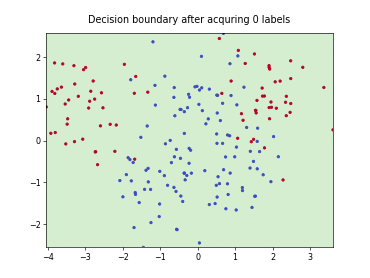skactiveml.pool.CostEmbeddingAL#
- class skactiveml.pool.CostEmbeddingAL(classes, base_regressor=None, cost_matrix=None, embed_dim=None, mds_params=None, nn_params=None, missing_label=nan, random_state=None)[source]#
Bases:
SingleAnnotatorPoolQueryStrategyActive Learning with Cost Embedding (ALCE).
Cost sensitive multi-class algorithm. Assume each class has at least one sample in the labeled pool. This implementation is based on libact.
- Parameters
- classes: array-like of shape(n_classes,)
- base_regressorsklearn regressor, optional (default=None)
- cost_matrix: array-like of shape (n_classes, n_classes),
- optional (default=None)
Cost matrix with cost_matrix[i,j] defining the cost of predicting class j for a sample with the actual class i. Only supported for least confident variant.
- missing_label: str or numeric, optional (default=MISSING_LABEL)
Specifies the symbol that represents a missing label.
- random_stateint or np.random.RandomState, optional
- (default=None)
Random state for annotator selection.
- embed_dimint, optional (default=None)
If is None, embed_dim = n_classes.
- mds_paramsdict, optional (default=None)
For further information, see https://scikit-learn.org/stable/modules/generated/sklearn.manifold.MDS.html
- nn_paramsdict, optional (default=None)
For further information, see https://scikit-learn.org/stable/modules/generated/sklearn.neighbors.NearestNeighbors.html
References
- [1] Kuan-Hao, and Hsuan-Tien Lin. “A Novel Uncertainty Sampling Algorithm
for Cost-sensitive Multiclass Active Learning”, In Proceedings of the IEEE International Conference on Data Mining (ICDM), 2016
Methods
Get metadata routing of this object.
get_params([deep])Get parameters for this estimator.
query(X, y[, sample_weight, candidates, ...])Query the next instance to be labeled.
set_params(**params)Set the parameters of this estimator.
- get_metadata_routing()#
Get metadata routing of this object.
Please check User Guide on how the routing mechanism works.
- Returns
- routingMetadataRequest
A
MetadataRequestencapsulating routing information.
- get_params(deep=True)#
Get parameters for this estimator.
- Parameters
- deepbool, default=True
If True, will return the parameters for this estimator and contained subobjects that are estimators.
- Returns
- paramsdict
Parameter names mapped to their values.
- query(X, y, sample_weight=None, candidates=None, batch_size=1, return_utilities=False)[source]#
Query the next instance to be labeled.
- Parameters
- Xarray-like of shape (n_samples, n_features)
Training data set, usually complete, i.e., including the labeled and unlabeled samples.
- yarray-like of shape (n_samples,)
Labels of the training data set (possibly including unlabeled ones indicated by self.MISSING_LABEL).
- sample_weight: array-like of shape (n_samples,), optional
- (default=None)
Weights of training samples in X.
- candidatesNone or array-like of shape (n_candidates), dtype=int or
array-like of shape (n_candidates, n_features), optional (default=None) If candidates is None, the unlabeled samples from (X,y) are considered as candidates. If candidates is of shape (n_candidates) and of type int, candidates is considered as the indices of the samples in (X,y). If candidates is of shape (n_candidates, n_features), the candidates are directly given in candidates (not necessarily contained in X). This is not supported by all query strategies.
- batch_sizeint, optional (default=1)
The number of samples to be selected in one AL cycle.
- return_utilitiesbool, optional (default=False)
If True, also return the utilities based on the query strategy.
- Returns
- query_indicesnumpy.ndarray of shape (batch_size,)
The query_indices indicate for which candidate sample a label is to queried, e.g., query_indices[0] indicates the first selected sample. If candidates is None or of shape (n_candidates), the indexing refers to samples in X. If candidates is of shape (n_candidates, n_features), the indexing refers to samples in candidates.
- utilitiesnumpy.ndarray of shape (batch_size, n_samples) or
numpy.ndarray of shape (batch_size, n_candidates) The utilities of samples after each selected sample of the batch, e.g., utilities[0] indicates the utilities used for selecting the first sample (with index query_indices[0]) of the batch. Utilities for labeled samples will be set to np.nan. If candidates is None or of shape (n_candidates), the indexing refers to samples in X. If candidates is of shape (n_candidates, n_features), the indexing refers to samples in candidates.
- set_params(**params)#
Set the parameters of this estimator.
The method works on simple estimators as well as on nested objects (such as
Pipeline). The latter have parameters of the form<component>__<parameter>so that it’s possible to update each component of a nested object.- Parameters
- **paramsdict
Estimator parameters.
- Returns
- selfestimator instance
Estimator instance.
